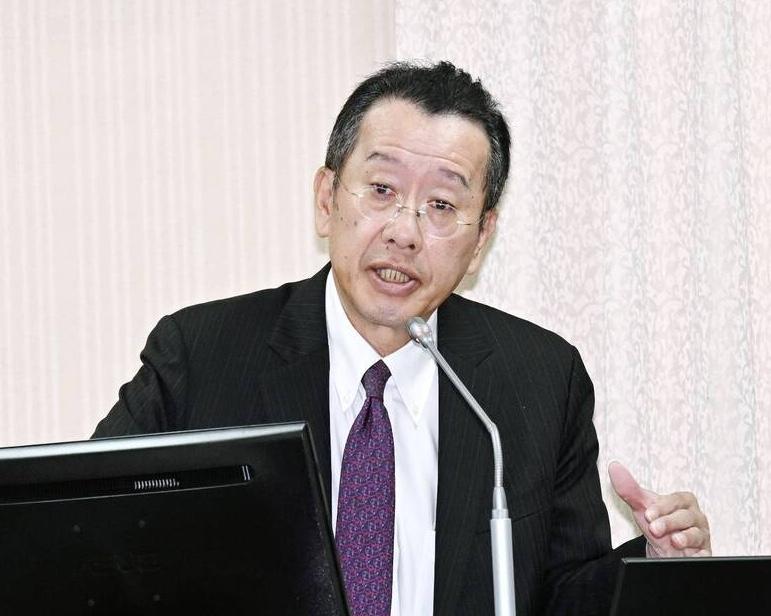Aerial photos of Hualien Air Base that appeared recently in a video on Chinese social media were digitally composed images and not taken by a drone that flew over the military base, Minister of National Defense Wellington Koo (顧立雄) said today.
The images appeared on Xiaohongshu (rednote in English) on Wednesday last week, a day after President William Lai's (賴清德) first anniversary in office, and seemed to be aerial shots taken by a drone, raising concerns of an undetected intrusion into Taiwan's airspace.

Photo: Fang Pin-chao, Taipei Times
They were highlighted in a video that used graphics to identify different structures on the air base, such as barracks and hangars, and also showed general distances and other features.
Speaking to reporters before a legislative hearing, Koo downplayed the images, saying that an internal analysis found they were post-processed using 3D compositing techniques and were not captured by a drone intruding into or filming outside the military base.
During the legislative session, Koo was asked by lawmakers if the video was part of a cognitive warfare campaign by the Chinese Communist Party, and he said it did contain certain such elements.
He said the military's political warfare units and spokesperson system needed to respond swiftly and assertively to counter such actions.
The air force said there was no drone intrusion into the Hualien base, but Air Force Chief of Staff Lee Ching-jan (李慶然) acknowledged they could be difficult to detect, especially given that Taiwan's installation of anti-drones systems had yet to be completed.
Fielding lawmakers' questions about whether the military is currently capable of visually detecting drones, Lee said that visual detection is extremely difficult at higher altitudes and complex backgrounds, and made even more difficult given that most drones are relatively small in size.
Lee said that the construction of both active and passive defense systems began in 2022, and parts of the bases where the systems will be located have been established.
Once all the facilities are fully equipped, "any drone intrusions will definitely be detected," Lee said, but he did not say when these anti-drone systems would be completed and fully activated.
When asked at the hearing about the progress of the army's procurement of 26 sets of anti-drone systems, Army Chief of Staff Chen Chien-yi (陳建義) said those systems were primarily for Taiwan's outlying islands.
The procurement and production agreement was approved early last month, with the first batch of 13 systems scheduled for delivery in early October, he said, adding that the second batch is set for delivery next year.

Taipei, New Taipei City, Keelung and Taoyuan would issue a decision at 8pm on whether to cancel work and school tomorrow due to forecasted heavy rain, Keelung Mayor Hsieh Kuo-liang (謝國樑) said today. Hsieh told reporters that absent some pressing reason, the four northern cities would announce the decision jointly at 8pm. Keelung is expected to receive between 300mm and 490mm of rain in the period from 2pm today through 2pm tomorrow, Central Weather Administration data showed. Keelung City Government regulations stipulate that school and work can be canceled if rain totals in mountainous or low-elevation areas are forecast to exceed 350mm in

EVA Airways president Sun Chia-ming (孫嘉明) and other senior executives yesterday bowed in apology over the death of a flight attendant, saying the company has begun improving its health-reporting, review and work coordination mechanisms. “We promise to handle this matter with the utmost responsibility to ensure safer and healthier working conditions for all EVA Air employees,” Sun said. The flight attendant, a woman surnamed Sun (孫), died on Friday last week of undisclosed causes shortly after returning from a work assignment in Milan, Italy, the airline said. Chinese-language media reported that the woman fell ill working on a Taipei-to-Milan flight on Sept. 22

COUNTERMEASURE: Taiwan was to implement controls for 47 tech products bound for South Africa after the latter downgraded and renamed Taipei’s ‘de facto’ offices The Ministry of Foreign Affairs is still reviewing a new agreement proposed by the South African government last month to regulate the status of reciprocal representative offices, Minister of Foreign Affairs Lin Chia-lung (林佳龍) said yesterday. Asked about the latest developments in a year-long controversy over Taiwan’s de facto representative office in South Africa, Lin during a legislative session said that the ministry was consulting with legal experts on the proposed new agreement. While the new proposal offers Taiwan greater flexibility, the ministry does not find it acceptable, Lin said without elaborating. The ministry is still open to resuming retaliatory measures against South

1.4nm WAFERS: While TSMC is gearing up to expand its overseas production, it would also continue to invest in Taiwan, company chairman and CEO C.C. Wei said Taiwan Semiconductor Manufacturing Co (TSMC) has applied for permission to construct a new plant in the Central Taiwan Science Park (中部科學園區), which it would use for the production of new high-speed wafers, the National Science and Technology Council said yesterday. The council, which supervises three major science parks in Taiwan, confirmed that the Central Taiwan Science Park Bureau had received an application on Friday from TSMC, the world’s largest contract chipmaker, to commence work on the new A14 fab. A14 technology, a 1.4 nanometer (nm) process, is designed to drive artificial intelligence transformation by enabling faster computing and greater power